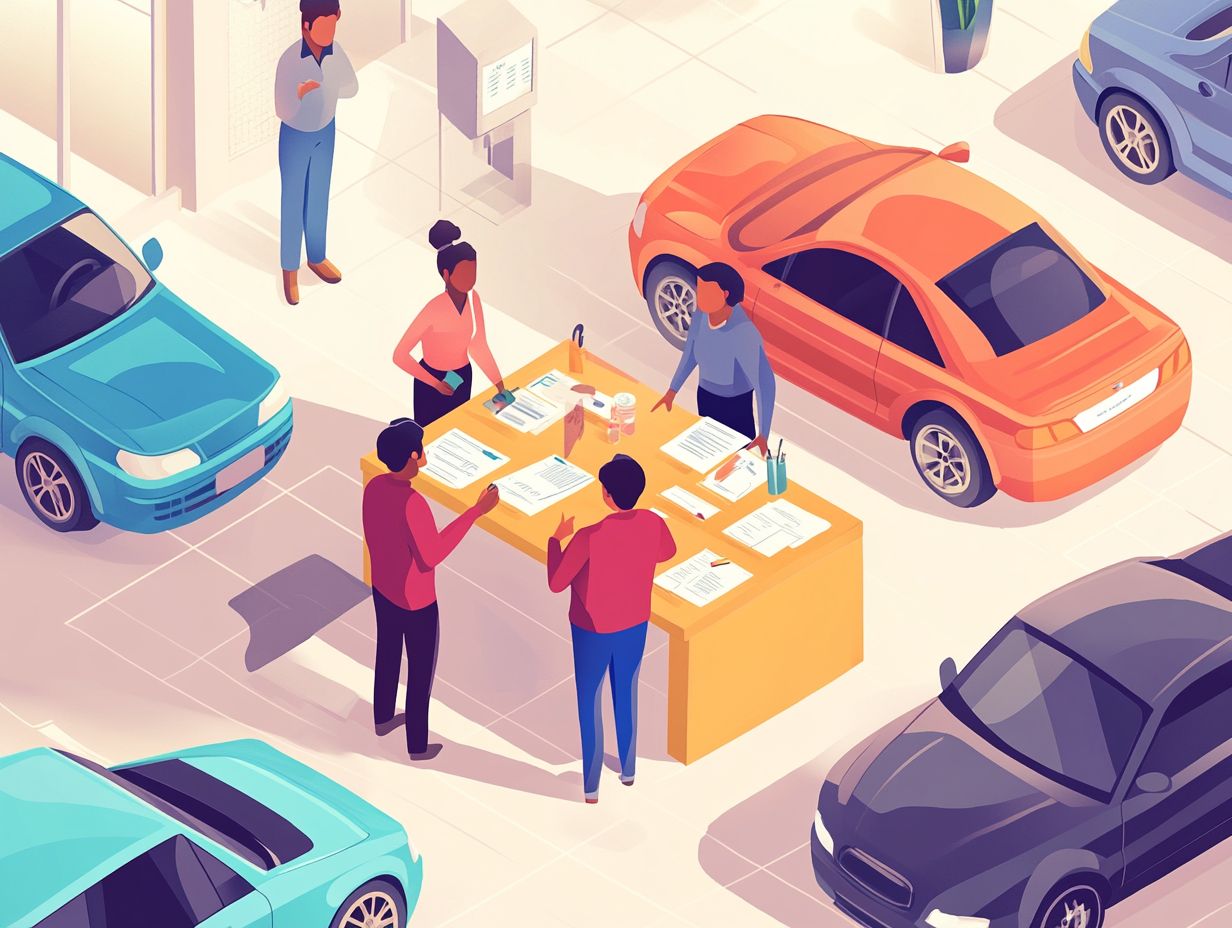7 Factors That Influence Car Price Negotiation
Buying a car can be an exhilarating yet daunting experience, especially when it comes to negotiating the price. Several factors significantly impact your success at the bargaining table. From the type and age of the car to the details of supply and demand, understanding these elements empowers you as a buyer.
This article dives into seven important factors that influence car price negotiation, offering tips on how to prepare and avoid common pitfalls. Equip yourself with knowledge and navigate the process confidently!
Contents
- Key Takeaways:
- 1. Type of Car
- 2. Age and Mileage
- 3. Supply and Demand
- 4. Location
- 5. Time of Year
- 6. Dealer Incentives
- 7. Your Negotiation Skills
- What Are the Best Times to Negotiate for a Car?
- How Can a Buyer Prepare for Negotiating a Car Price?
- What Are Some Common Tactics Used by Dealers in Negotiations?
- How Can a Buyer Use Their Knowledge of These Factors to Get the Best Price?
- What Are the Benefits of Negotiating a Car Price?
- How Can a Buyer Avoid Common Mistakes in Car Price Negotiation?
- Frequently Asked Questions
- 1. What are the 7 factors that influence car price negotiation?
- 2. How does market demand affect car price negotiation?
- 3. Can the features of a car affect its price negotiation?
- 4. How does brand reputation impact car price negotiation?
- 5. Is the model year an important factor in car price negotiation?
- 6. Does mileage affect car price negotiation?
Key Takeaways:

The car type, age, and mileage affect its negotiation price. Factors like supply and demand, location, and the time of year are also important.
Improve your negotiation skills and be aware of common dealer tactics to get the best price.
1. Type of Car
When negotiating a car price, the type of car you select can dramatically influence the deal. Different car models and used vehicles have varying market values and features that directly impact your negotiation tips for used car buyers.
For instance, a popular sedan known for its reliability may hold a higher resale value compared to a niche sports car. This makes it essential to understand how these models are viewed in the market.
Specific features like advanced safety technology, impressive fuel efficiency, and luxury amenities can enhance a vehicle’s appeal, giving you valuable leverage in negotiations. By grasping these distinctions, you can navigate discussions with sellers, ensuring you secure a fair price and find a vehicle that aligns with your needs.
2. Age and Mileage
The age and mileage of your vehicle are important factors influencing its market value. Understanding the details of vehicle condition can significantly enhance your trade-in value during negotiations.
As vehicles age, they generally lose value, and many buyers view low mileage as a sign of better mechanical reliability and longer lifespan. However, assessing a used vehicle’s condition includes more than just checking the odometer; consider aspects like interior wear, engine performance, and tire condition.
A well-maintained vehicle with moderate mileage could command a higher trade-in value compared to an older model that has seen heavy use and shows visible damage. By researching similar models and their conditions, you can gain invaluable insights, boosting your confidence and effectiveness as a negotiator.
3. Supply and Demand
Understanding supply and demand in the auto industry is crucial for you as a buyer seeking to negotiate the best price for a vehicle. This is particularly important during times of inventory shortages, when market values can fluctuate significantly.
When demand exceeds supply, which often happens during economic booms or supply chain disruptions, prices can rise beyond the typical market range. Stay updated on current trends, such as the growing popularity of electric vehicles or ongoing chip shortages, to gain a competitive edge.
Recognizing these dynamics enables you to enter negotiations with confidence, showcasing your understanding of market conditions. Keep an eye on local dealerships and compare offers to uncover potential savings opportunities, ensuring you make informed decisions in your next automotive purchase.
4. Location
Location plays a crucial role in the car-buying process. It significantly influences the availability of specific models and the competition among dealerships, both of which can shape your negotiation strategy and final purchase price.
In busy urban areas, you may find limited selections and higher prices driven by low inventory. Conversely, in rural areas, you often have a wider array of vehicles, which can foster competition among dealerships and give you more negotiating power.
This dynamic can lead to notable price differences for the same car model. Dealers in competitive markets might be more willing to negotiate, while those in less competitive areas may stick to their pricing. By understanding the local market and employing the best negotiation strategies for used cars, you can make informed decisions that can save you money and enhance your buying experience.
5. Time of Year

The time of year can dramatically influence car pricing strategies. Dealerships often roll out promotional offers and incentives during specific seasons. This is when savvy buyers like you can find unique opportunities to negotiate.
Understanding these seasonal trends can unlock substantial savings. For example, during the holiday season, dealerships aim to clear out inventory to make way for newer models, leading to significant markdowns.
The end of the month can also be a key time for salespeople looking to meet their quotas. This can result in more flexible pricing. Keep an eye out for special occasions like Labor Day or Black Friday, when enticing sales events typically occur.
Do your homework now to save big! Research and time your purchases strategically. Don t hesitate to negotiate aggressively, ideally armed with competitor pricing and available incentives.
6. Dealer Incentives
Being aware of dealer incentives is vital as these rebates and promotions can significantly lower the out-the-door price. They can also give you an edge in negotiations.
Understand the different types of incentives available. These usually include:
- Cash rebates: These can directly reduce your purchase price.
- Flexible financing options: These can help ease your monthly budget concerns.
Since these offers are often time-sensitive, it’s essential to research and compare them in advance. Knowing what incentives are available enables you to negotiate more effectively, ensuring that you don t miss out on substantial savings.
Ultimately, informed shoppers like you are in a stronger position to secure favorable terms that align perfectly with your financial goals. Use this knowledge to negotiate your next car purchase confidently!
7. Your Negotiation Skills
Your negotiation skills are one of your most valuable assets in securing the best price for your car. Mastering effective strategies allows you to navigate the process with confidence and success.
Understanding the market value of the vehicle you’re eyeing is an essential first step. Research recent sales data and analyze pricing trends in your area. This knowledge enables you to engage effectively in discussions.
Being aware of common sales tactics like creating a sense of urgency or emphasizing limited availability can give you a significant advantage. For instance, having quotes from similar cars at competing dealerships can help you challenge inflated prices.
This ultimately leads to a more favorable deal that can greatly impact your final purchase price. Use your skills to negotiate effectively!
What Are the Best Times to Negotiate for a Car?
Identifying the best times to negotiate can lead to significant savings. Various factors, including promotional offers and dealership sales events, create optimal conditions for negotiation.
The end of the month often presents favorable circumstances, as dealerships work diligently to meet their monthly sales quotas. Holiday weekends like Memorial Day and Labor Day typically feature special promotions that can enhance your negotiating power. The end of the year is another prime opportunity, with dealerships eager to clear out inventory for new models.
Stay informed about these strategic moments throughout the calendar. This will help you effectively time your purchases and leverage these opportunities to negotiate better deals, driving away with a more advantageous purchase.
How Can a Buyer Prepare for Negotiating a Car Price?
Preparing to negotiate requires thorough research and familiarity with pricing resources like Kelley Blue Book. This tool offers valuable insights into market values and helps you understand fair pricing for the vehicle you have in mind.
Beyond using these resources, delve into the specific conditions of the car you re considering. Pay attention to factors such as mileage, previous accidents, and service history.
Understanding trade-in values can also enhance your negotiating power. Knowing what similar vehicles are selling for gives you an edge during discussions. Various online pricing tools allow you to benchmark what others are paying, ensuring your offer is well-informed.
Additionally, gathering data such as Carfax reports or vehicle inspections can significantly bolster your position, enabling you to negotiate with confidence and effectiveness. Prepare well to maximize your negotiating power!
What Are Some Common Tactics Used by Dealers in Negotiations?

Understanding the common tactics employed by dealers in negotiations is essential for you as a buyer. Being aware of these strategies can significantly enhance your ability to navigate the negotiation process with finesse.
Savvy buyers recognize that dealers often prefer to present monthly payment options instead of the total price you’ll pay, including fees and taxes. By shifting your focus from monthly payments to the overall expenses associated with the purchase, you’ll be better equipped to assess the deal’s true value.
Engaging in thorough research before stepping into the dealership equips you with vital information about fair prices and current market values. Utilizing tools like pricing guides and online resources helps you establish a strong baseline for negotiations.
This preparation allows you to counteract pressure from salespeople to make quick decisions with confidence and clarity.
How Can a Buyer Use Their Knowledge of These Factors to Get the Best Price?
Your understanding of critical factors like supply and demand, incentives, and dealer tactics can be your secret weapon in crafting effective negotiation strategies. To enhance your approach, learn how to prepare for a car negotiation. This knowledge ultimately leads to the best car price and monthly payment options.
By grasping how market trends influence vehicle pricing, you can enter negotiations with a clearer perspective. For example, if a specific model has recently surged in popularity, it’s essential to recognize that heightened demand might restrict your ability to negotiate on price. To enhance your skills, consider mastering car price negotiation techniques.
Being aware of common dealer incentives such as end-of-month sales goals or manufacturer rebates can give you an edge during discussions. Successful negotiators often build rapport with salespeople while clearly presenting their research findings.
This approach fosters trust and encourages dealers to offer more favorable options. Maintaining a confident and well-informed demeanor can significantly impact your ability to secure advantageous terms.
What Are the Benefits of Negotiating a Car Price?
Negotiating a car price offers numerous advantages for you as a buyer. Not only can you potentially lower the purchase price, but you can also secure favorable financing options and minimize your long-term financial commitments associated with the vehicle.
Imagine the thrill of driving away with a fantastic deal! If you successfully negotiate a $3,000 reduction, you could significantly decrease your monthly payments roughly $50 less each month over a five-year loan term.
By negotiating better loan terms, like lower interest rates, you might save thousands over the life of the car. A recent survey revealed that nearly 60% of consumers felt more confident in their financial decisions after successfully negotiating better terms.
This illustrates that effective negotiation provides immediate savings and contributes to your financial wellness over time.
How Can a Buyer Avoid Common Mistakes in Car Price Negotiation?
Avoiding common mistakes in car price negotiation is essential for you as a buyer. Developing essential negotiation skills for car buyers can help you avoid errors like insufficient research, allowing emotions to sway decisions, and overlooking financing options, which can easily lead to unfavorable outcomes.
Many buyers enter negotiations without a solid grasp of the vehicle’s market value. It s crucial for you to compare prices across various platforms and dealerships.
Allowing emotions to cloud your judgment can result in hasty decisions. Maintaining a calm and composed mindset during negotiations is vital.
Neglecting financing options may cause you to accept terms that aren’t in your best interest. By being well-prepared and informed, you can confidently navigate the process and secure the best possible deal.
Frequently Asked Questions
1. What are the 7 factors that influence car price negotiation?

The 7 factors that influence car price negotiation are: market demand, vehicle features, brand reputation, model year, mileage, vehicle condition, and location. To learn more about these aspects, check out these 7 tips for effective car negotiation.
Now that you know the tactics, go out there and secure the best deal!
2. How does market demand affect car price negotiation?
Market demand greatly influences car price negotiation. When a car model is in high demand, sellers are often less flexible on the price. To improve your chances, consider using negotiation techniques for first-time buyers.
3. Can the features of a car affect its price negotiation?
Yes, car features can impact price negotiation. Cars with advanced features, like navigation systems or leather seats, typically hold higher prices and may be less open to negotiation.
4. How does brand reputation impact car price negotiation?
Brand reputation is crucial in car price negotiation. Reliable brands often have higher-value vehicles that are less negotiable.
5. Is the model year an important factor in car price negotiation?
Yes, the model year matters in price negotiation. Newer models generally cost more and are less negotiable, while older models usually have a lower price and more room for discussion.
6. Does mileage affect car price negotiation?
Yes, a car s mileage plays a role in price negotiation. Cars with low mileage are seen as more valuable and have less wiggle room on price compared to high-mileage cars.






